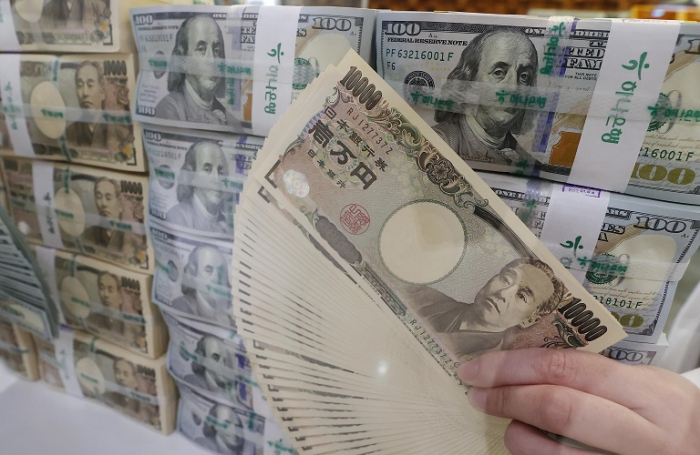Economy
South Korean exporters fret over tumbling yen
Automakers, steelmakers and petrochemical manufacturers are expected to lose price competitiveness against their Japanese rivals
By Mar 29, 2022 (Gmt+09:00)
2
Min read
Most Read
LG Chem to sell water filter business to Glenwood PE for $692 million


Kyobo Life poised to buy Japan’s SBI Group-owned savings bank


KT&G eyes overseas M&A after rejecting activist fund's offer


StockX in merger talks with Naver’s online reseller Kream


Mirae Asset to be named Korea Post’s core real estate fund operator



South Korean exporters such as Hyundai Motor Co. and Kia Corp. are jittery as the country’s won currency hit its strongest level versus the Japanese yen in more than three years, threatening the exporters' competitiveness against their neighboring rivals in overseas markets.
The won on Tuesday gained 0.7% to 9.9 against the yen at the close of South Korea’s currency market, its firmest position versus the Japanese unit since Dec. 5, 2018. The won has gained 4.3% to the yen so far this year.
That is expected to boost the price competitiveness of Japanese products in exports markets, especially against South Korean items such as automobiles, experts said.
“US customers’ top priority is price when they compare Hyundai and Toyota,” said Kim Pil-soo, an automotive engineering professor at Daelim University. “Korean automakers are likely to lose margins.”
Companies in other industries are expected to suffer from weaker price competitiveness.
“Key export products including cars, petrochemicals and steel compete with the Japanese,” said Lee Jae-soo, head of regional cooperation at the Federation of Korean Industries (FKI), a business lobby group. “Profits at companies in these sectors are likely to fall in the short term.”
NO LONGER A SAFE HAVEN?
The yen has been regarded as a safe haven along with the dollar and gold, given Japan’s ample foreign currency assets and strong economic fundamentals. The country holds the world’s second-largest foreign exchange reserves of $1.39 trillion as of end-January, after China.
Japanese households and companies that utilized the country’s consistently low-interest rates to buy high-yield assets in other nations often unwound the overseas investments whenever a crisis hit home. That was one of the main factors supporting the yen when the world was in trouble.

But the major currency lost ground despite the war in Ukraine, falling to its lowest level since August 2015 on Monday.
That came as Japan’s central bank stuck to its ultra-loose policy, while its global peers such as the US Federal Reserve raised interest rates to curb inflation. The Bank of Korea is expected to raise interest rates further after restoring the policy rate to a pre-pandemic level of 1.25% in January with three hikes since August of last year.
On the other hand, the Bank of Japan offered to buy unlimited amounts of 10-year government bonds to keep its bond yields from rising too much further. Earlier this month, it maintained its short-term rate target at -0.1% set earlier this month.
The world’s third-largest economy is also losing steam. Japan’s economic recovery from COVID-19 was predicted to be the slowest among the Group of Seven, according to the International Monetary Fund. The country’s gross domestic product this year was forecast to be similar to the 2019 level before the pandemic hit globally. The US economy was expected to grow 6.2% in 2022 from three years ago, while Canada and Germany were predicted to expand 3.2% and 1.7%, respectively.
Japan’s current account balance has also been weakening. It reported deficits in both February and March as the war in Ukraine ramped up commodity prices.
Write to Ik-Hwan Kim and Hyung-Kyu Kim at lovepen@hankyung.com
Jongwoo Cheon edited this article.
More to Read
-
 Foreign exchangeKorea won at three-year high vs yen on rate differentials
Foreign exchangeKorea won at three-year high vs yen on rate differentialsMar 28, 2022 (Gmt+09:00)
2 Min read -
 Central bankBOK governor nominee stokes slower rate hike expectations
Central bankBOK governor nominee stokes slower rate hike expectationsMar 25, 2022 (Gmt+09:00)
2 Min read -
 EconomyBOK sees inflation at 11-year high as oil tops $100 on Ukraine crisis
EconomyBOK sees inflation at 11-year high as oil tops $100 on Ukraine crisisFeb 24, 2022 (Gmt+09:00)
3 Min read -
 Banking & FinanceBOK’s mission impossible: To lower both inflation and govt bond yields
Banking & FinanceBOK’s mission impossible: To lower both inflation and govt bond yieldsFeb 15, 2022 (Gmt+09:00)
3 Min read -
 Foreign exchangeWon hits 15-month low as global inflation woes spur equity outflow
Foreign exchangeWon hits 15-month low as global inflation woes spur equity outflowOct 12, 2021 (Gmt+09:00)
3 Min read
Comment 0
LOG IN


